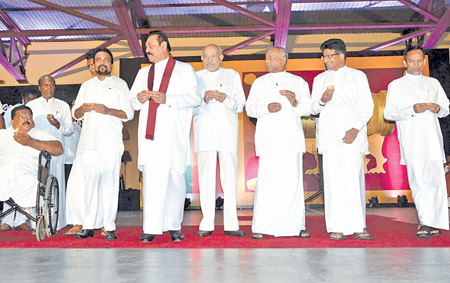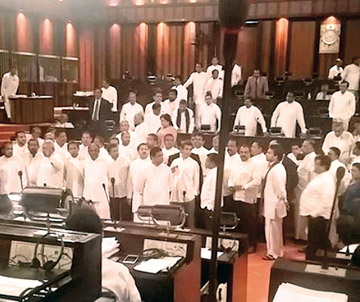|
Economy, Geneva challenges:
Power fights should not thwart bipartisan governance
by Dr. Paikasothy saravanamuttu
The General Election of August 17, 2015 was significant in two
respects. First, there is agreement across the board that the election
was the freest and fairest in recent memory. Both the Elections
Commissioner and the Police were able to operate as intended without
hindrance or interference and both did so, pro-actively, to ensure
adherence to the election laws. The general political climate was
enabling, allowing for the free flow of discussion and debate to an
extent not evinced in recent elections.
 |
|
Former President Mahinda
Rajapaksa at a rally at the Viharamahadevi Park.
Pic: Vipula Amerasinghe |
In political terms, the election was significant because, for the
second time in eight months, the Sri Lankan electorate rejected Mahinda
Rajapaksa. By returning the UNF as the single largest party in the new
Parliament, the Sri Lankan electorate has dealt Mr Rajapaksa and his
cohorts a body blow but not quite a knockout. The UPFA campaign, ceded
to him by the President, garnered over four million votes and just 11
seats less than the UNF. However, set against the result of the last
general election, there was a considerable swing to the UNF across the
country and in the final analysis when the JVP and TNA vote is added to
the UNF's, the total anti Rajapaksa vote amounts to 56 percent of the
country.
Diminishing
Mahinda Rajapaksa's appeal is diminishing in the country but it is
not diminished. He commands a core vote that responds to his
majoritarian populist image liberally laced with fear about the fate of
the Sinhala community under the UNF and of war heroes being turned into
war criminals. Fear is the key for him, but fear is now yielding
diminishing returns.
Perhaps he realizes this and, therefore, said that he would take the
lead in the new parliament on national security issues. Fear is still
the key, nevertheless. Failure on the part of the
Sirisena-Wickremesinghe combine will provide him an opportunity to keep
the Rajapaksa dynastic project alive. He is serving notice that it is in
effect, the sword of Damocles over the Yahapalanaya project.
As media reports indicate, the new government will be UNF-SLFP in
that the latter will be brought in to bolster the former and to deliver
the message that there is a bipartisan consensus to take the governance
reform which commenced in January forward. Already, pro - Sirisena
loyalists who were defeated at the polls have been incorporated in the
UPFA national list with this in mind, even though this flies in the face
of basic democratic values.
SLFPers in government may trim the sails of their UNP counterparts on
questions related to the Geneva report, accountability, a settlement of
the ethnic problem and the economy. The nature of the coalition
government is compromise for consensus. Let us hope, it is not fudge or
a "fight to the finish" of the governance project.
It appears that Rajapaksa and his loyalists are biding their time for
the moment and going, albeit reluctantly and in some quarters with some
recalcitrance, with the flow as it were.
 |
| Pandemonium:
The passage of the 19th Amendment to the Constitution in
Parliament was successful after initial hiccups. |
Questions also arise with regard to the position of the Leader of the
Opposition and as to which party/parties will now constitute the
opposition. One assumes that the TNA and the JVP are supportive of
governance reforms.
At the same time, there are differences of opinion, markedly so,
between the former and the UNF on a political and constitutional
settlement of the ethnic problem and accountability, and as far as the
latter is concerned on the economy. It remains to be seen as to how all
of this will play out.
Opposition
Of pivotal importance for the new government is the relationship
between President Maithripala Sirisena and Prime Minister Ranil
Wickremesinghe. That, the two sing from the same song sheet, is crucial
for the longevity and success of the government and, the sustenance of
the national interest.
Were partisan interest to intrude too early in the day and
bipartisanship give way to two-party competition for governmental power,
instability and turbulence could result to the detriment of the national
interest. The challenges for the new government abound. They go to the
heart of the matter of our willingness and ability to build a political
and constitutional architecture for all citizens of this country and a
sound framework for economic prosperity.
Geneva
In the next few weeks, the government will have to formulate its
response to the report of the Office of the High Commissioner of Human
Rights, particularly to that section of this report that deals with the
investigation conducted under the aegis of this Office on allegations of
war crimes and crimes against humanity in the last phase of the war. The
report will be formally presented to the UN Human Rights Council in
Geneva in the last week of September, but shared with the Government of
Sri Lanka (GOSL) in the coming week.
The report is expected to be strong, concluding that such crimes were
committed. The GOSL succeeded in ensuring that the report would be
postponed - it was scheduled to have come out in March - on the grounds
that it did not want it to be an issue in the general election.
At the same time the GOSL has talked about instituting a credible
domestic mechanism to deal with these issues and work appears to have
commenced on this within the government. The hope and expectation is
that all of this will be made public, now that the election is over, and
that there will be public consultations on what is being proposed.
Transitional justice is seen to have four pillars - justice and
accountability, truth, reparations and guarantees of non-recurrence. The
credible domestic mechanism proposed by the government to deal with the
first of these as far as the families of victims are concerned will not
be credible if it is exclusively domestic.
Many of the families of the victims maintain that a combination of
the two - domestic and international - essentially a hybrid mechanism
will not be acceptable either. International it must be since their
experience of past commissions has been dismal. The government will have
to convince and persuade constituencies in both the north and the south
of the country. It will have to decide as to whether there will be
trials, who will judge and who will prosecute in this event?
It is crucial too that progress in respect of each pillar is
complemented and reinforced by progress in respect of the other three
and that government policy on transitional justice is internally
coherent as much as it is convincing both domestically and
internationally. Both constituencies have to be convinced of a serious
commitment and of demonstrable progress in this regard. There is no
arbitrary deadline as far as this is concerned and, therefore, there
should be no rush to tick boxes to convince of progress. It is worth
taking the time to get it right - the international community too would
appreciate and accommodate this.
Budget
Whilst Geneva lands on the plate of the government in September,
October and November will be budget-time and by no means less
testing.There are a number of challenges here, which a UNF government
may have dealt with differently to what it may now have to do on account
of SLFP/UPFA colleagues. There is the question of a bloated public
service, debt and unemployment and the fact that we are an ageing
population and the consequences this has on the health sector and
pensions for instance. There is surely some unpleasant medicine to be
swallowed on this score and political support to underpin this will be
crucial. Will the government or a part of it, be able to carry the
people along ?
The serious business of governing begins. At the very least, it must
be founded on governance, and politically, assurance must be made doubly
sure that this indeed be the case. That remains as always, the
responsibility of the citizens. |

